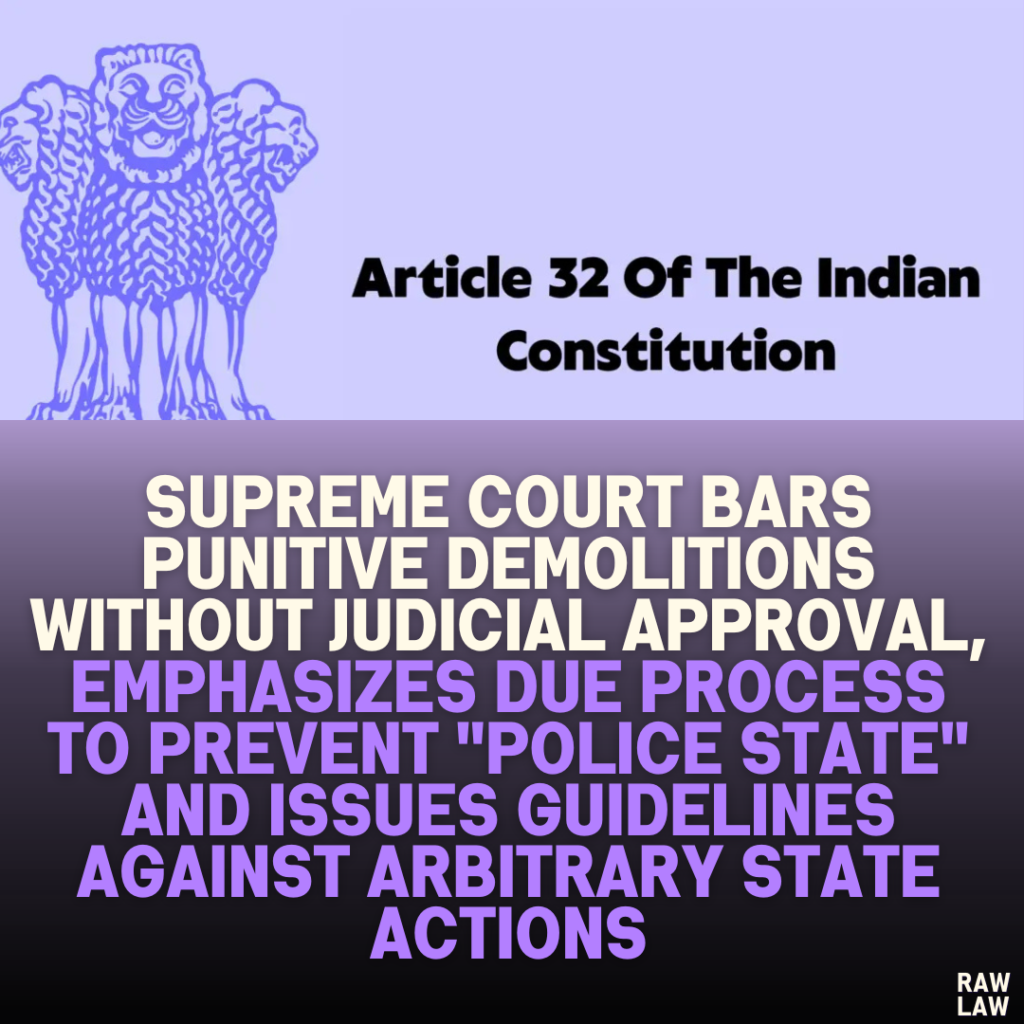Court’s Decision: The Supreme Court ruled that properties of individuals accused of crimes cannot be demolished without following due legal process. The judgment emphasized the principles of the rule of law, separation of powers, and public accountability, stressing that any punitive actions, including demolitions, must be conducted in strict adherence to legal norms to prevent arbitrary use of executive power. It mandated that no demolition should proceed without a court order, except for unauthorized structures in public spaces.
Facts: This case involved writ petitions under Article 32 of the Constitution, seeking relief for citizens whose properties had been demolished by state authorities on grounds of their involvement in criminal offenses. The petitioners argued that these demolitions were carried out without proper legal procedures and amounted to punitive actions against accused persons without judicial sanction. The state, particularly Uttar Pradesh, argued that demolitions were conducted in compliance with municipal laws.
Issues:
- Whether state authorities can demolish properties of accused individuals as a punitive measure without judicial approval.
- The extent to which due process must be observed in demolitions linked to criminal allegations.
Petitioner’s Arguments: The petitioners contended that demolitions as a punitive measure against accused individuals violated the principle of due process. They argued that such actions were arbitrary and lacked legal grounding, violating the fundamental rights of property and dignity guaranteed by the Constitution. They sought strict guidelines to regulate demolitions, prevent arbitrary executive action, and ensure accountability of officials involved in such actions.
Respondent’s Arguments: The State, particularly the government of Uttar Pradesh, asserted that the demolitions were legal and in line with existing municipal laws, which allow removal of unauthorized structures. They contended that due process was followed where necessary and that demolitions were conducted only for illegal encroachments.
Analysis of the Law: The Court highlighted that the rule of law, as a foundational constitutional principle, requires that no person can be deprived of property without a legal procedure. It emphasized that executive actions should not encroach upon judicial functions, as the separation of powers doctrine strictly prohibits punitive actions by the executive without judicial authorization.
Precedent Analysis: The Court cited various landmark cases, including Indira Nehru Gandhi v. Raj Narain and I.R. Coelho v. State of Tamil Nadu, affirming the rule of law as a part of the basic structure of the Constitution and underscoring the judiciary’s role as the guardian of individual rights against arbitrary state actions.
Court’s Reasoning: The Court reasoned that allowing demolitions as a punitive measure for alleged crimes without judicial oversight would undermine the rule of law and separation of powers, fostering a “police state” where executive authorities could act unrestrained. The Court underscored that the Constitution entrusts punishment solely to the judiciary, which ensures fairness and adherence to legal principles.
Conclusion: The Supreme Court prohibited the demolition of properties of accused persons as a punitive measure without judicial sanction. It ordered that due process must be strictly observed, with necessary court approvals obtained before any demolition, except in cases of unauthorized structures in public spaces, where immediate public interest requires prompt action.
Implications: This judgment establishes a robust framework to prevent misuse of state power in demolitions linked to criminal allegations, ensuring accountability and fairness. It reinforces the necessity of judicial oversight in punitive actions, safeguarding citizens’ rights against arbitrary executive actions. The ruling also mandates state compliance with these guidelines nationwide, setting a precedent for protective measures in similar cases across India.




Pingback: Bombay High Court Affirms Concurrent Jurisdiction Under Indian Succession Act, Permits Amendment to Include Multi-Jurisdictional Properties in Estate Administration - Raw Law